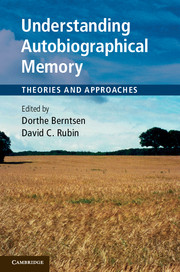Book contents
- Frontmatter
- Contents
- List of figures
- List of tables
- List of contributors
- Preface
- Acknowledgements
- 1 Introduction
- Part I Approaches to the study of autobiographical memory
- Part II Neural studies of autobiographical memory
- Part III Social and cultural aspects of autobiographical memory
- Part IV Development of autobiographical memory from infancy to old age
- Part V Evolution and basic processes of autobiographical memory
- Part VI Discussion
- 17 Understanding autobiographical memory: an ecological theory
- Index
- References
17 - Understanding autobiographical memory: an ecological theory
Published online by Cambridge University Press: 05 November 2012
- Frontmatter
- Contents
- List of figures
- List of tables
- List of contributors
- Preface
- Acknowledgements
- 1 Introduction
- Part I Approaches to the study of autobiographical memory
- Part II Neural studies of autobiographical memory
- Part III Social and cultural aspects of autobiographical memory
- Part IV Development of autobiographical memory from infancy to old age
- Part V Evolution and basic processes of autobiographical memory
- Part VI Discussion
- 17 Understanding autobiographical memory: an ecological theory
- Index
- References
Summary
If we are in search of the self, we can look either inward or outward. To look inward is to focus on mental representations, on the self-concept or inner experience. To look outward is to see the self as embedded in its environment, ecologically and socially situated in relation to other objects and persons.
(Neisser, 1994, p. 392)It is appropriate to begin this chapter by quoting one of the most influential pioneers of cognitive psychology (Neisser, 1967) and autobiographical memory research (Neisser, 1986, 1988, 1994). The position expressed by Neisser is not just relevant in relation to understanding the self. In this chapter we will propose a similar ecological approach to the understanding of autobiographical memory.
According to most definitions, autobiographical memory is the ability to consciously remember personal events. However, personal events are not unchanging, ontological entities. They are constructions that vary substantially with regard to their temporal, spatial, and social complexity. Some event constructions are simple – e.g., eating a sandwich in a cafe – whereas others are more complicated – e.g., eating a sandwich in a cafe while attending a conference on autobiographical memory and discussing shared past experiences with colleagues. In the latter example, the event (eating the sandwich) embeds other personal events (the shared past experiences being discussed over the meal) and is itself embedded in the overarching event of participating in the conference. It involves complex social knowledge, including knowledge of conferences and knowledge of the other persons who take part in the event, such as their roles, expertise, and mutual relations.
- Type
- Chapter
- Information
- Understanding Autobiographical MemoryTheories and Approaches, pp. 333 - 355Publisher: Cambridge University PressPrint publication year: 2012
References
- 9
- Cited by



